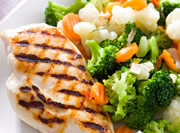
However, providing healthy food choices may not be enough to get patients back into good shape, especially for those struggling with being overweight or obese. While eating nutritious foods is certainly a key part of managing weight and shedding pounds, it’s equally important to help patients develop better eating habits. These strategies can assist individuals with controlling cravings, boosting metabolic health and burning calories. Here are some tips and tricks for food service managers to keep in mind for promoting improved dietary practices.
Make breakfast a must
There’s plenty of truth behind the old saying that “breakfast is the most important meal of the day,” and patients struggling with weight management issues would do well to keep this maxim in mind. For starters, breakfast is the first meal of the day, making it vital to replenishing the body’s stores of energy after a good night of sleep. Without the appropriate sources of fuel, many vital functions can be hampered by inadequate nutrition.
Furthermore, eating a variety of healthy foods in the morning works to jumpstart individuals’ metabolisms after periods of rest. The body tends to slow down the process of converting calories into energy during the night, and skipping breakfast can result in the body going into starvation mode by continuing to conserve fat and calories. By kicking metabolism into gear early in the morning, patients can work to burn more calories throughout the day.
Eat smaller meals more frequently
Many people have gotten used to the three meal system of breakfast, lunch and dinner. While it’s not necessarily bad to stick to this routine, patients concerned about their weight may benefit from adopting a new meal plan that involves reducing portion sizes and increasing the number of meals consumed every day. Research has shown that a great way to keep the body’s metabolism working hard and burning an optimal number of calories is by eating five small meal throughout the day.
So how can patients who are used to the breakfast, lunch and dinner cycle begin to alter their habits? Reducing the amount of food consumed during these meals and inserting two snacking times before and after lunch can be a great way to transition to the five meal system. Filling snacks of nuts, bananas or granola bars can keep patients satisfied while also boosting their metabolic efficiency.
Cut out late night snacking
While eating more smaller meals throughout the day can increase the number of calories the body burns, there is one time that patients should avoid snacking – after dinner. Not only does late-night snacking increase the total number of calories consumed, but the body also has a more difficult time converting them into energy. This is because the body’s metabolism slows down during sleep, retaining those extra calories as added pounds.
Ideally, patients should try to avoid eating any foods after dinner or following 9 p.m. This gives the body time to begin the digestive processes for the final meals of the day before patients head to bed.







